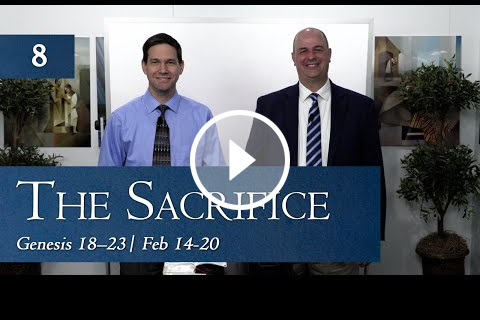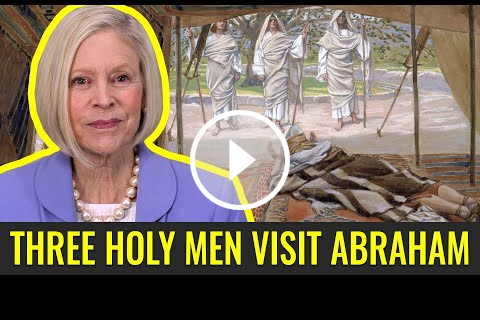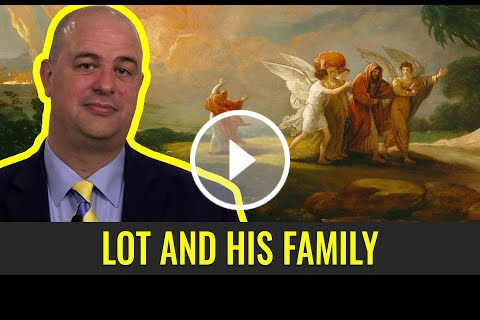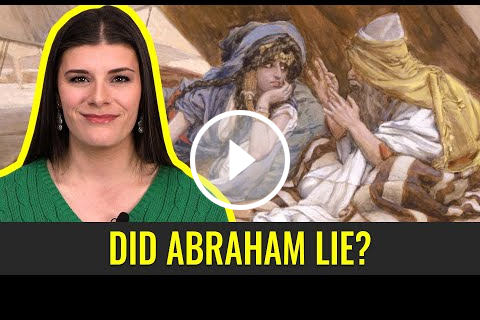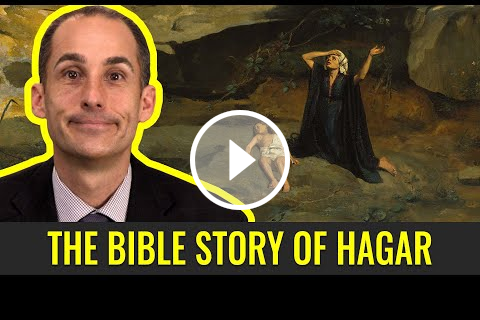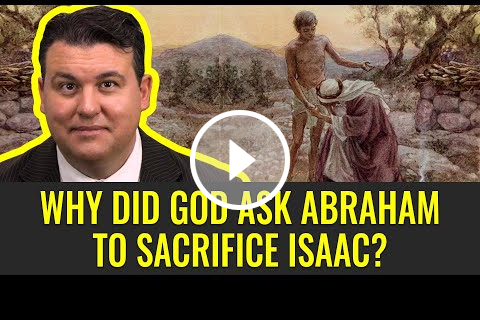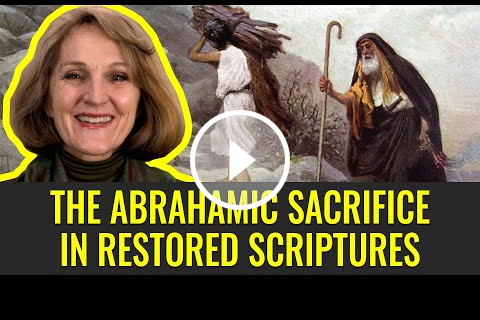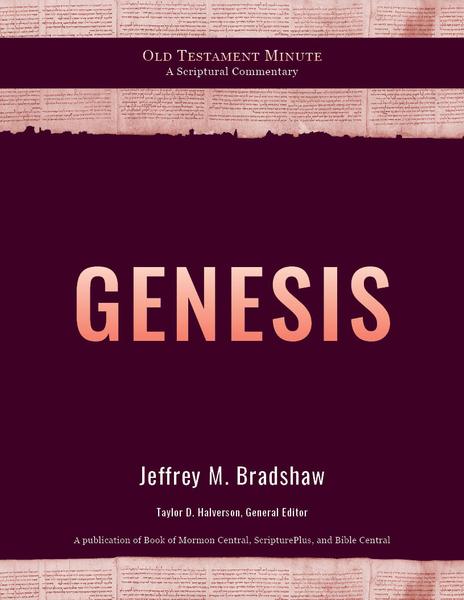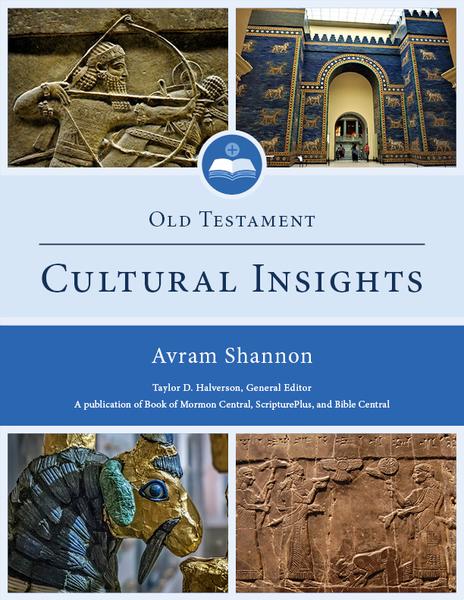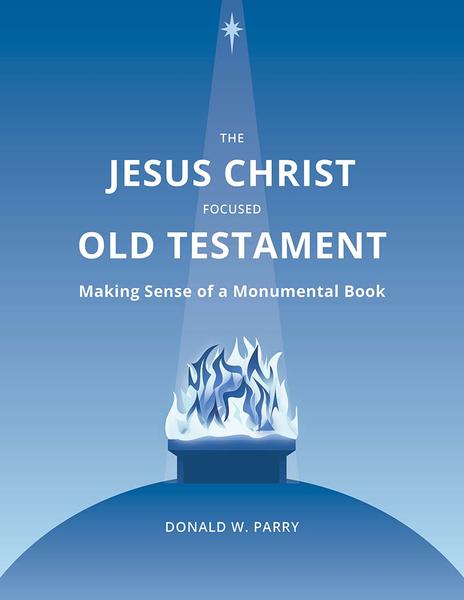Feb 14-20 (Genesis 18–23) Come Follow Me Insights with Taylor and Tyler – powered by Happy Scribe
I’m Taylor.
And I’m Tyler.
This is the Book of Mormon Central’s Come Follow Me Insights.
Today, Genesis, chapters 18-23.
And what we have here entering into this foreign country, there’s a lot that gets recorded in the Bible, but there’s a lot that’s left on set. Have you ever told a story? And your listeners are in on kind of the inside track of the joke or the context. And there’s a lot of details that you don’t even need to explain because your audience already knows all sorts of things about maybe the geography or certain customs or culture or even funny phrases or symbolic phrases. And that’s what we have going on in the Bible is that there’s a lot that’s left on set. And so culturally, we read some of these things. We’re like, wow, that’s not quite how I live my life. And so, again, we do want to find where do we see gospel principles and where can we also understand cultural things that were different back then that could distract us from the gospel message? But hopefully if we understand the culture and say, oh, I understand why they did it that way.
So chapter 18, we jump in with the story of Abraham and his wife Sarah. And keep in mind, let’s set the stage here. That here’s the Mediterranean Sea. We’re looking now at a horizontal view of the land, and then you get the Holy Land that is shaped kind of like this. So this would be sea level here at the coastline. And then you come up Jerusalem is sitting right here just on the westward side of the Mount of Olives. When you pop over the top of the Mount of Olives or Mount Scopus to the north any of those, and you start coming down into the Jordan River Valley. It is a totally different climate and flora and fauna here compared to this side. Right.
You got the rain shadow, so it will rain here. And it is like one of the driest deserts down in this region. You head north of the Galilee. It’s beautiful. It’s fresh, just giving 75 miles. It’s very different ecological environments. But this is kind of the howling wilderness where Jesus went for 40 days.
That’s right. So as you come clear down here, you’re going to end up at 1300ft below sea level. When you get to the Dead Sea, it would win the limbo competition. How low can you go on the Earth? That’s as low as you can go. There’s nowhere else on planet Earth where you can physically walk at a lower elevation than around the Dead Sea. And in fact, today it’s even lower because the Dead Sea is dying. Shall we say it’s drying up even more. It’s not being replenished.
And briefly, the reason is there’s such a growing population in the Middle East. Water is essential. And so more and more people are drawing water on the Jordan River, and it’s not flowing into the Dead Sea, but the Jordan River is making the desert to blossom as a rose at the cost of the Dead Sea.
That’s right. So based on that, now, that is your horizontal view. If we were to look at a map from the satellite view, now you have Jerusalem right here and the Mount of Olives, the Ridge line here. And then all of this part here is this steep decline down into the Dead Sea area or what we would call the Jordan River Valley. So the reason for all of this is to set the stage for today’s lesson. Remember that when Abraham and Sarah came out of Egypt with Lot and his family and his household, they came into here, and that’s when they realized, you know what? We can’t live in the same place. We need to divide. And Abraham allowed Lot to make the choice, and Lot chose this Jordan River Valley side, not the desert park, but down in the Plains. They call Sodom and Gomorrah, the cities of the Plains. And it is a very fertile area here with this Jordan River flowing through there and very beautiful land.
Alex point out that anthropologists have actually discovered that probably the oldest city in the world is Jericho. And it seems like that food production, at least the domestication of plants, seems to happen right here in this region. So if Lot is looking for a great place where there’s plenty of fertile land to grow almost any crop you could want, that’s a place because you come up here or even on this side, it’s a tough place. Maybe you can do some olive orchards and maybe some shepherding, but there’s not a lot going on over here.
So now we’ve set the stage. You know, that Abraham and his wife living on this side are being visited in the beginning of chapter 18 by three men. If you look at verse verse one. The Lord appeared unto him in the Plains of Mary as he sat in the tent door in the heat of the day. And so he looks up and he sees three men standing by him, and he runs to them, and he provides everything that they would need food, drink, sit in the shade of the tree because it’s the heat of the day and he takes care of their needs. And then they have this conversation with him about his wife conceiving and having a son. Well, look at the look at verse nine. They said unto him, Where is Sarah, thy wife? And he said, Behold, in the tent. And he said, I will certainly return unto thee according to the time of life, unless thy wife shall have a son. And Sarah heard it in the tent door, which was behind him. Now, verse eleven is a very important verse for understanding the story. Now, Abraham and Sarah were old and well stricken in age, and it ceased to be with Sarah, after the manner of women, the childbearing years have passed for her.
But don’t you love the next part here? Verse twelve, therefore, Sarah laughed within herself, saying, After I’m waxed old, shall I have pleasure, my Lord, being old? Also the word here, she laughed. There’s this fun word in the Hebrew that means laughter and rejoicing. And the word, as Taylor has said multiple times, the lesson is in the name. Well, nine months later, they’re going to have a little baby boy and they’re going to name him laughter and rejoicing. Isaac, I love verse 14. When the Lord said unto Abraham, verse 14, is anything too hard for the Lord to me? There’s a beautiful connection to that first chapter of Luke in the New Testament where Luke is telling you the story of Zechariah and Elizabeth and very similar old couple, well stricken in years past the childbearing years. And Zacharias is told that his wife will conceive and bear a son. And it doesn’t make any sense. So the phrase Luke uses there is for with God, nothing shall be impossible. Yeah. There’s no earthly explanation as to why she should be able to have a child at this age. But with God, that’s not hard.
I love the human element of these stories. It actually reminds me that God works with very human people. And it gives me encouragement that these famous characters, these famous ancestors of ours were just like you and me, that God was working with them. And God works with us to the point that he brings about his divine purposes and then he brings about the real laughter of rejoicing and joy. So that’s one thing I really like from this. And also just for the ancient Israelites, this would be a very compelling story. Remember, Abraham comes from mesopania. Excuse me. It’s a landscape full of cities. So he’s a city dweller and he’s now a tent dweller in Atlanta Canaan. And he’s a soldier in the land. He’s kind of dependent on people. God really helping him. And so when people come by, he’s running out to help them. Now point out that that culture is alive and well today throughout the Middle East and actually Latin America. You might hear the phrase in Spanish, Mikasa is sukasa, my house is your house. It actually comes out of this Middle Eastern culture that when you’re in a tent and people are traveling, they need a place, protection against the sun, get water and food.
And there’s deep power in welcoming people into the tent. Think about the symbolism we use in the Church, about lengthening the cords of the tent, strengthening the stakes. It’s all about this tent symbolism. We also have the phrase in Arabic, if you’re welcoming somebody today, you’d say Aslam asahlan, which literally is the plural form of tents and families, which is like, welcome to my tent, welcome to my family. And so Abraham is the epitome of somebody who cares about others and is willing to give of his own resources to serve others. And this is all in the context. He doesn’t know these men. Actually, it’s God himself, because there’s this euphemism. When you hear the phrase the angel of the Lord, It really is talking about God himself. Abraham didn’t know that these were God’s messengers or even God himself, and that Abraham is willing to serve anybody who has come near. And I’ll just say one final thing. Also in the ancient world, you didn’t eat meals with your enemy. You actually to have peace, you would bring somebody in your tent and have a meal. That’s actually how you would have a peace treaty.
Think about how God invites us to the Sacrament table, Where he’s invited us into his home to partake of a meal with him. It means we’re not at odds with God. We’re not at enmity with God. It is a peace offering from God and from us to each other that we are going to live in peace with one another. So all this kind of cultural background, These are things that are kind of left unsaid that the ancient insulates knew this stuff, but the authors didn’t always declare to us like the cultural meaning of what’s going on.
So as these three men, these three visitors leave, they tell Abraham that they’re going down to Sodom, where his nephew Lot lives. And Abraham knows that. And they give this warning. In verse 20, The Lord said, because the cry of Sodom and Gomorrah is great, and because their sin is very grievous, I will go down now and see whether they have done altogether according to the cry of it which is coming to me, and if not, I will know. And so they turned and left, at which point, Abraham asks this question of the Lord. Verse 24, paradventure, there be 50 righteous within the city. Wilt thou also destroy and not spare the place for the 50 righteous that are therein? Verse 26 says, and the Lord said, if I find in Sodom and 50 righteous within the city, Then will I spare all the place for their sakes? Can you picture Abraham thinking, okay, 50, we’ve got a threshold here. Sorry, I don’t want to overstep my bounds here, but what if we’re lacking five? What if it’s just 45 righteous people? What then? And the Lord says, 545, I’ll spare the city. And Abraham says, what about 40?
And the Lord’s response, you got it? What about 30? Yes, what about 20?
Since you asked, I’ll give it to you.
And he goes down to ten. He says, what if you can find ten? Now, as you read through that entire column of scripture with Abraham, kind of negotiating with the Lord, Trying to find the lowest possible limit of what’s it going to take to save this city. And the Lord gets it at ten. And we know in the next chapter that it gets destroyed. Which tells us from the Lord’s perspective, it’s not our judgment, but it’s the Lord’s judgment that he couldn’t find ten righteous people in the entire city of Sodom, or he would have spared it. The question that might come up for some of you is, why did that conversation even take place in the first place? When Abraham first asked the Lord the question, Will you spare it if you can find 50? The question is, why didn’t God just look at Abraham and say, look, if I can find ten, I’ll spare the city, why go 50, then 45, then 40, then 30, then 20, then ten? God already knows the answer, so why didn’t he make it easier for Abraham? I don’t have the answer to that question, but I do know something from my own experience and from other scripture examples that God cares a great deal about agency and about us choosing to use that agency however we see fit.
And he respects and honors that agency. So much so that one of the lessons for me from this little section here is God isn’t going to take away the joy of discovery, the joy of inquisitive thinking and asking questions and using agency to think something through and figure out where are the boundaries. He respects that, and he honors that. And I love the fact that God gives us art not just our life, but our agency and this ability, this freedom to explore and to ask questions that at first might sound silly from the angelic perspective, but God lets us keep asking, what about 45? What about 40? What about 30? What about 20? What about ten? He lets us be who we are at the level we are in our progression, in our use of agency. And I love that. And there’s probably a really significant doctrinal reason why this story took place. And I’m missing that Mark. But this is a simple way for little old Tyler Griffin to make sense of what’s going on here.
And what I love that Tyler has done is help us to make sense of a story that’s thousands of years old and have it make sense for our day. Because in Abraham’s day, it’s interesting. Middle Eastern bargaining is a real thing. There are not set prices. In fact, it turns out if you ask for the price on any item, the cultural meaning to that is you want to buy it. And now let the bargaining happen. Now, for Westerners, we’re like, what? I was just curious. Well, for the Middle Easterners, it’s like, well, you declared you wanted this object, and when you ask for the price, that means we have to negotiate. And if you can get into negotiation, kind of be kind of a fun game. So from one perspective, it seems like a cultural bargaining going on. But actually there may be something more significant going on. We know that God has made significant covenants to Abraham. In fact, God calls Abraham a friend. God is willing to let Abraham’s righteous desires work out in God’s will.
Now, as we jump into chapter 19, it starts out in verse one, and there came two Angels to Sodom it even Joseph Smith changed the number two to match the number three from the chapter before with the Abraham story. And Lot sat in the gate of Sodom let’s just pause it for just a minute.
Now, most of the cities that we live in today do not have walls around them. And in the ancient world, many cities were walled. It was a form of protection. And the city gate was where much of the political judgment and economic activity had happened. Imagine it’s like the town square. So when you hear city gate at any point in the Bible, imagine this is the town square. This is where all the merchants are. This is where anybody who’s coming out, in and out, you can check to make sure they actually belong there. And if you are sitting in a city gate, you often are somebody in a position of power, wealth, authority, and prestige. So a lot, apparently at this point, had become he’s risen to power.
Whether it’s political or economic or both, he’s sitting in power.
And if you go to Israel today, up in the north, there’s the ancient city of Dan. And you actually can see one of these city gates. And we’ll put an image here for you to look at. And these are very common. And so it’s interesting here, like Abraham, Lot is immediately welcoming to strangers, which was not always the case in these cities because you never know who these people are. Are they going to come in and set fire to the city and steal our things? And Lot is with Alacrity, trying to serve them. But again, this is a significant thing, that the most significant events in the cities often happened at city gates.
Good. So Lot invites them into his house, into his home, feeds them. You get the experience with the men of the city demanding that they be sent out.
So this is a tough chapter. If you remember, in the Middle East, anciently and still the day, your hospitality, somebody was really crucial. Now let’s actually tie us into Jesus. He’s trying to invite us into his home. He wants us to come into his home so he can take care of our needs. So this is a big deal about the hospitality you provide. Now, what greater form of inhospitality could a city do than to have strangers come in and you abuse them? God would never do that. He would welcome us and wash our feet and comfort us, not abuse us. And so even today, God expects us to treat the foreigners and strangers well because he tells the people, you Israelites were slaves in a foreign country. You should never treat people poorly. And so then you get this passage. It seems like Lot is saying, well, I’m going to protect these guests by giving away my daughters to the mob. Some biblical scholars have looked at this and said it actually may be that the way it’s expressed. A Lot actually is saying to the crowd, do you really think that’s how to treat people like, as if I’d give my daughters up to you guys?
You might say something like that today in irony to get the point across of how egregious somebody has been in their thoughts or actions. And so if that’s the case, Lot actually isn’t offering his daughters up, but he’s actually trying to jar this mob into thinking like, oh, my gosh, yeah, we should not be treating people like this. You wouldn’t treat my daughters like this. I mean, really, you expect me to hand them out to you? Is that how it’s supposed to happen now? Again, we don’t really know. And I sometimes think to myself, Boy, it would have been great if the plain and precious things have been left in the scriptures and it’s been left out. My life probably Mary have been better that way to fly through the rest of this story.
They’re smitten with blindness in verse eleven. And then these visitors, the three men say to Lot, Gather any of your family and leave early, because we’re going to destroy Sodom and Gomorrah. And in verse 15, when the morning arose, then the Angels hastened.
By the way, this is crazy because look at verse 16. And while Lot lingered, now we’re going to get to Abraham story in Genesis 22 where God asks him to sacrifice his son. And it says, early in the morning, Abraham rises up to go do the deed in here. They’re like, can you get out of town? And he’s like, well.
Take hold up on the hand.
He’s like, I got to do the dishes. Maybe I got to latch up my shoes a bit more. Maybe we got to close the curtains. It’s like, dude, get out of town now. And they literally got by the hand, which is not always typical of Angels intervening that physically in somebody’s Salvation.
So you have to wait until you get to the very bottom of that column in our English Bible down to verse 22 has the escape thither, for I cannot do anything till outcome thither. Therefore, the name of the city was called Zuar, where he has to leave Sodom and go to Zuar before the Angels can do what they need to do. So the sun was risen upon the Earth when Lot entered into Zoar. And then verse 24, the Lord reigned upon Sodom and upon Gomorrah brimstone and fire from the Lord out of heaven. And he overthrew those cities and all the plain and all the inhabitants of the cities and that which grew up on the ground. Now, you’ll notice verse 26, but his wife looked back from behind him and she became a pillar of salt. This is a fascinating verse. It’s one that Jesus even will quote in the New Testament. Remember, Lot’s wife, in talking about don’t turn back. Once you’ve engaged, go forward on the Covenant path. The way that this often gets depicted in cartoons or in visual media is they’re running away from the city, up the Hill, and lots of wife just can’t help herself.
And she looks back and instantly turns into a pillar of salt. Now, I don’t know because we don’t have that footage from back then. It could have happened that way. If you look at this word, she looked back. The connotation there of the word in the Hebrew as I see it, is that it’s to look upon, to gaze upon Longly, to really behold something, pay attention to it. It’s as if she’s saying, I can’t leave that. I don’t believe that it’s actually going to be destroyed. And I don’t want to leave behind all of of the money and the relationships and all the pleasures that I was enjoying there. So it’s not just a physical looking back. It could have been, but it could be that the looking back is step one of multiple steps to actually go back to the city and be destroyed with the rest of the inhabitants.
Now I’m going to add something that might be a bit of speculation. The name Gamora itself, the Hebrew word itself is Amora. There’s this letter in Hebrew we don’t have in the English Alphabet. It’s called Ayun you actually kind of constrict your vocal cords here. So it’s amuara. And I may be wrong about this, but I think it’s interesting because you have something in the Book of Mormon called the Hill Kamora, where destruction happens. And it is possible the word Ka in Hebrew literally means like or as or like unto. And I wonder if the word Kamora might be related to Gamora, because actually it might read as like unto Gamora. You would say Kamora. That’s how you say it in Hebrew, which would mean like in a Gamora, just like in Gamora, it was destroyed for wickedness and God wiped the people out. Actually, they wiped themselves out through wickedness. The same thing happens at Kamora. Now, whether that is linguistically accurate, we at least have a case where people do not listen to God’s servants and they get themselves wiped out.
Yes. Possibilities. So as they’re leaving it’s a lot and it’s two daughters, and then they leave Zor and go up further into the mountains into a cave. And you get this story of lots two daughters getting them drunk, doing something very foolish. And there are a lot of questions that a lot of people over a lot of years have asked regarding this story of why is it in the Bible? It’s so far out there. It’s so strange to us. Keep in mind, this is a Hebrew record. This is a record that is beloved. This Old Testament, we call it the Old Testament. But the Jews, they call it the Tenach. It’s got the Torah, the first five books of Moses and the teachings of the prophets. And then the wisdom literature in there, it’s their Bible and it’s telling their story. And those Israelite people have some known enemies, the Assyrians, the Babylonians, the Moabites, the Ammonites, the Philistines, at different stages. To them, they’re saying, this explains two of our enemies, the Moabites and the Ammonites. This is where they come from.
You can imagine the ancient Angelites sitting around the campfire. Most people are literate and they’re having the scriptures read to them. Tell us a story about where did our enemies come from. Oh, well, let’s tell that story. That’s a crazy story. And what culture doesn’t have stories about their enemies that make their enemies seem like they’ve come from pretty bad origins. This is quite common throughout human history. And it just happens to get preserved here because not only is the scripture, it also is the national literature of the ancient Israelites. And it was their story. If we actually go back and get to interview the Moabites and Ammonites, they might say, actually the details are wrong because we got the records, we don’t know.
What we’ve got is what comes to us in the buy one. And it feels very strange. But keep in mind, just as a side note, in passing, the Moabites, there is one Moabite that is very significant in our story coming up in the future. And her name is Ruth. She’s actually going to become the wife of Boaz, an Israelite. And from them you’re going to get David through Jesse and then down the line to Jesus. So the Savior’s own genealogy chart contains Ruth, a Moabite. Chapter 20. We now get Abraham going down towards the coastline, further to the west, down with the Philistines. And here you get King Abmelech. And you’ve got the same story that happened back in chapter twelve with the Pharaoh down in Egypt, where Abraham is all concerned that his wife is very fair to look upon. And he’s afraid that a bin Lake is going to do harm to Abraham so that he can take his wife. So he comes in verse two saying, she is my sister. So God came to a Bimlic in a dream and tells him, the woman you’ve taken is a man’s wife. And you get this long discourse between them and then later on between bin Laden and Abraham.
And he’s saying, what did you do? Why did you do that to me? Why did you say she was your sister?
And I think part of what’s going on is ancient Israelites. When they hear the story, they’re like, okay, God actually will protect his people, that you can actually engage in reasonable conversation with people and resolve difficult problems. So we may not look at this and say, oh, my gosh, I have got to live exactly like Abraham and a biblical Sarah here. But we could say, how do I engage in meaningful conversation over very difficult topics that I can trust the other person, that they had good intentions, I had good intentions. Maybe there was a miscommunication or misunderstanding culturally, but we can work through it with the help of the Lord.
So then at the end of this chapter, Abraham prays for ABIM luck and God healed them and his wife and his maid servants, and they all bear children.
Again, there’s some interesting things going on with chapter 20. Some of the reasons it might be included is it helps us to see again Abraham’s goodness and righteousness that he is able to commune with the Lord in a way that blesses the lives of other people. Just like we saw where he was trying to save Sodom Gamora, he now saves Abimillak. We also have these stories about how did God bless Abraham with so much wealth and prosperity and resources. So we know that he got a lot of resources out of Egypt. Here again, he’s moved into the land in a bin Lake. After all this occasion, it’s like, here’s a bunch of sheep here’s, a thousand silver shekels. And so it’s a way of God fulfilling the promises that he given to Abraham in Genesis twelve. Like, yeah, you’re going to have some kind of crazy situations you’re going to have to work through, but in the end, I’m going to turn it all for your good. So this may be one of the reasons why these stories are preserved is to help remind people that God will fulfill his word to give the prosperity in the land to Abraham.
Excellent. So in chapter 21, Isaac is born, and we’re told that Abraham, verse five was 100 years old when Isaac was born, and Sarah is 90. We know from the story and in verse six and Sarah said, God has made me to laugh, so that all that here will laugh with me. You could replace both of those with to laugh and rejoice what started like an impossibility. Now that laughter of irony becomes laughter of rejoicing.
Yes, this laughter of like, oh, my gosh, the Lord did it. How many of us have ever laughed in relief or laughed in the disbelief that something amazing happened that God has done for us? This is what Sarah has done, and I love that they give the name of the child, Isaac, so they will always remember that nothing is impossible with the Lord. Can anything be too hard with the Lord? No, let’s laugh and joy, because God can save all of us and can wipe away all of our tears.
And in verse nine, the next event mentioned after the weaning of Isaac is where Sarah is going to kick out Hagar and Ishmael her son out into the wilderness. Look at verse nine.
Sarah saw the son of Hagar the Egyptian which she had born unto Abraham mocking there may have been some kind of impropriety that Ishmael had done that was grievous enough that it actually had caused significant problems in the family. We’re not exactly sure. But the way this word shows up, particularly the fact that the Israelites, the same word is used for them where God is now really angry for them, sporting or mocking, and he gets mad enough that he wants to kill everybody. And Moses has to intervene and say, Lord, you’ve taken these people out of Egypt. We can work with them and let’s give them another chance. So this would help us to understand this hard passage where Hagar and Ishmael were sent off into the wilderness. But then something really beautiful happens.
Yeah. Now, as the very next verse, verse ten, Wherefore she said unto Abraham, Cast out this bond woman and her son, for the son of this bond woman shall not be heir with my son, even with Isaac. Maybe there’s more to this story than we have all of the details in our Bible today. So they go out and Hagar thinks they’re going to die. And if you go to the wilderness of Bersheva, you can see that there’s not a lot of chance of survival out there. But God saves them and he saves this young lad. And Abraham was given that promise that he would grow up to be a great nation. He has fulfilled that. Now we skip the rest of that story, the other details to come into chapter 22. I could be wrong, Taylor, but this is probably, in my opinion, one of the most significant chapters of the entire Old Testament that we’re going to talk about or study this entire year. It’s this great sacrifice of Abraham and Isaac. You’ll notice it begins in chapter one with and it came to pass after these things that God did tempt Abraham and set unto him Abraham.
And he said, Behold, here I am.
So I was in a Bible class in graduate school, and we read this. I’ve read this passage a lot, and we actually got to and it came to pass after these things. And the professor stopped us. I’m like, what is there to talk about? It came to pass after these things. Let’s get to this compelling story. Why do the inspired Bible writers start this chapter this way after what things he’s like? We’re now 13 chapters into the Abraham story. You need to think about from Abraham’s perspective. Abraham. Abraham has been with God now for these 13 chapters. And there’s been a lot of crazy incidences. And in every case, in every single case, God has come through and proved to Abraham that God will deliver on his promises in every single case. And so when it says after these things, it’s almost like a reflection, like, I can trust God, I can trust God that Abraham has gone through all these trust building exercises that he has 100% total perfect faith that God will deliver on his promises, which might help us understand why Abraham passes one of the most difficult tests any of us might ever be asked to undergo.
Amen to that. So you’ll notice in your King James Version here the word that those translators chose was that God did tempt Abraham. The word tempt in English usually denotes an enticement to do evil or to rock in your path to get you to stumble and fall. I love the fact that if you look at that Hebrew footnote there, it says in Hebrew, you could also interpret this as test or prove. I think those are words we in our Church culture would be a little more comfortable using, that God is proving or testing Abraham. Now I do need to pause there, because it’s not as if God is doing what a teacher or a College Professor would do where I’ve taught all these lessons. Now I need to give them a test and see if they really learned it, see if they really understand these principles. There’s a big difference between us and God putting somebody to a test because God already knows. He already knows the beginning, from the end. He already knows all of the details about exactly what Abraham is going to do. But Abraham doesn’t know the depth of his devotion, the breadth of his discipleship and his faithfulness.
So this test isn’t to teach God things that God doesn’t already know because God already knows all those answers. This test is to become an opportunity for Abraham to learn some things about God, about Abraham and about Isaac. We’ll show you that in a minute.
This is really important. We should dwell on this. Just repeat it. God wanted Abraham to be tested so that Abraham’s testimony would increase about God’s character and who Abraham is and even Isaac. We’ve shared this in the past, but this is worth writing up again. Every month we do testimony meetings. Our testimonies are based on things that we have been tested on. We know these things. We’ve been tested on them. If we had talked to Abraham in Genesis, Chapter 20 or 21, he had not yet been tested on this particular area of his life. And so he may not have had a testimony of how God would fulfill this aspect of the Covenant. But after the test, Abraham has a testimony of God and even of himself. So when we look at ourselves and we look at life and how things are hard, I get encouraged by these ancient biblical ancestors that they developed testimonies by going through tests. And it wasn’t fun. And so when I’m being tested, I can say, oh, this is an opportunity for me to strengthen my testimony and to have a broader perspective of a testimony, of learning more about who God is to me and who I am to him and who I am to other people.
So did you notice at the end of verse one, when God called to Abraham, he didn’t say, you again, or who art thou, Lord? Like Saul does in the Acts, he recognizes the voice of God, and he responds in a very Christlike way, behold, here I am. It’s that Christlike way of saying, Here am I, send me. I love the phrase that President Thomas S. Monsoon used to use on a variety of occasions when he said, I want the Lord to know that if he needs an errand run, Tommy Monsoon will run that errand for him. I love that feeling of just complete, devoted discipleship that you see reflected here as well in Abraham’s story. Now look at verse two, and he said, Take now thy son, thine only son, Isaac. If you like marking your scriptures, you could just Mark the elements of this story that proved beautifully symbolic, beautiful metaphors to connect you to the story of Jesus Christ, thine only son, Isaac, whom thou lovest and get thee into the land of Moriah. So if you look back at our map here of the Holy Land, remember you have Jerusalem here, Shiva down to the south.
It’s about a three day journey for them.
And it’s a tough journey.
It’s not a great journey. And if you Zoom in on the city of Jerusalem at the time of Jesus, you have two mountains, pretty much that make up the city of Jerusalem. You have Mount Zion over here on the west, and you have Mount Mariah on the east. And then here’s the Kidron Valley. And here’s the Hinum Valley that connects here. The Mount of Olives is right here. And then you can go down towards Jericho. There, in between, you have this Valley. Mount Mariah is where the temple of Solomon was first built. And then at the time of Jesus, you get Herod’s temple, built here on Mount Mariah. And on the highest point of that Mount is the traditional site for where this sacrifice is going to take place on Mount Mariah. Of all of the things that you could ask Abraham to do, this is possibly or probably the hardest test you could give him, because Abraham, more than any of our other biblical patriarchs, Abraham, knows what it’s like to actually be placed on an altar by a father or turned over to people, to be placed on an altar and have a knife raised and be ready to be sacrificed.
He’s the one person who can actually tell you exactly what that feels like. And now God is asking him to do that.
Paul talks about Abraham’s actions on this day are counted unto him as covenantal, faithfulness or righteousness. And what’s interesting is that if Abraham, which I believe he has come to fully and implicitly trust that God will always fulfill his covenantal promises. And therefore, if I go through Abraham’s thinking, if I go through the sacrifice, God is required to either raise up Isaac immediately back to me or get me other children. God is covenantly bound to do this. Therefore, I have just learned to implicitly trust that God knows what he’s doing. I really don’t like this. I imagine he felt that way. But I will fully trust God. And it turns out what we call the Abrahamic Covenant is actually God’s Covenant to Abraham. And it’s about God revealing himself to his people and Abraham being the first person so that they would know how to fully trust God. How often are we asked to believe in God if you insert the word trust, that’s what we mean here. Now, this is one of the greatest challenges to anybody’s trust in God. But this is really what it comes down to is God wanted Abraham to show that he fully trusted God.
So there’s another element at play here, symbolically that we need to introduce, and it actually makes a big difference in the story flow here. And the question is, one of how old was Isaac? I don’t know about you, but when I was raised, going to primary, going through seminary and Sunday school, most visual or graphical depictions that I had seen of this particular story. In Genesis 22, the sacrifice of Abraham and Isaac depicted a young boy, a lad that would be, I don’t know, somewhere between the ages of seven to maybe 14 or 15 at the most in various depictions. But he’s always a lad. He’s always very young, very small in comparison to his aged father, Abraham. There’s nothing in Genesis 22 that gives us a timestamp. There’s no marker for the year or to tell us how old Abraham or Isaac is when these events are taking place. So what can we deduce about his age? All we get is from the chapter before we know he was weaned, right. So from a young child who has just been, weaned somewhere older than that and somewhere younger than the very next event that’s going to happen is in Genesis chapter 23, where it tells you that Sarah, Isaac’s mother, passes away and it gives you a timestamp there, it tells you she’s 127 years old.
So if she’s 127 years old when she dies, she was 90 when he was born, that means that when his mother passes away, Isaac is 37 years old. So somewhere between, I don’t know, three years old, roughly two to three years old and 37, that’s our X marks the spot that’s Isaac’s age somewhere in that range. So an eight year old Isaac would fit there, an eleven or twelve or 15 year old would fit there. But we get this little verse from the Book of Mormon, and I don’t know how literally God intended for us to interpret this. So don’t take this as absolute dogmatic law. But in Jacob, chapter four, verse five, Jacob, the brother of Nephi, tells us, Behold, they meaning all of the prophets who have come before Jacob and Nephi. They believed in Christ and worshiped the Father in his name. And also we worship the Father in his name. And for this intent we keep the law of Moses. It pointing our souls to him. And for this cause it is sanctified unto us for righteousness, even as it was accounted unto Abraham in the wilderness to be obedient under the commands of God in offering up his son Isaac, which is a similitude of God and his only begotten son.
Now, if we take Jacob literally and we take him at his word, then we would say the strictest interpretation of that would be if it’s in some militude, then we want as Mary things similar as possible. We’re going to Mount Mariah to perform that sacrifice. Abraham is willing to offer up his son. And if that’s the case that it’s in simulator to the sacrifice of the only begotten of the Father, then Abraham isn’t doing anything to Isaac that Isaac isn’t willing to have done to him. Isaac’s agency is just as much in play as his Abraham’s. If it’s in someitude of the sacrifice of Jesus Christ and of heavenly Father as he describes it here, that means that when we jump into this story, if that’s the case, if we want it to be nearly exact on the similitude, then Isaac would be roughly 33 years old in the prime of his life, making Abraham 133 years old, at which point Abraham is not going to do anything that Isaac doesn’t want him to do. Now, again, I don’t know if this is the case. It could be that it’s younger. I know the scriptures refer to him as a lad, but I guess if you were 133, somebody who was 33 would probably seem like a lad to you as well.
So I don’t know if that disqualifies this possibility. So now, if you picture this story, picture Abraham taking Isaac, his son, saying, Come with me and taking some of his servants. And they take wood for the burnt offering. And then verse four, then on the third day, Abraham lifted up his eyes and saw the place afar off. And he said unto the young men, abidey here with the ass, and I and the lad will go Yonder and worship and come again to you. Notice what happens in verse six. And Abraham took the wood of the burnt offering and laid it upon Isaac, his son. And he took the fire in his hand and a knife. And they went, both of them together. So here’s Isaac carrying the wood on his back that many have tied into Christ carrying the cross. And then verse seven, Isaac Spake unto Abraham his father and said, My father. And he said, Here am I, my my son. And he said, Behold the fire in the wood. But where is the lamb for a burned offering? We came to do this, but we forgot to bring a lamb. In verse eight, Abraham said, My son, God will provide himself a lamb for a burned offering.
So they went, both of them together. That’s incredible faith. And by the way, there’s amazing symbolism tied into that answer. God will provide himself a lamb for a burned offering. In the English KJV text here, you could interpret that a couple of different ways. Yeah, God’s going to provide us a lamb when we get up to the top of the mountain, which is the intent that I think Isaac understood in that setting. But for us, looking back in time, through the symbolic lenses, we see that indeed, God himself, Jesus Christ, would provide himself a lamb for the burned offering. And so they came to the place which God had told him of. And Abraham built an altar there. So our text refers to Abraham building the altar. It makes me wonder if Abraham presided, so to speak, over the process of building the altar. But if it wasn’t the son who did the creation of the altar on which he himself would be offered, if it’s a similitude to that great and last sacrifice. Now can you picture that moment? What we don’t have in scripture, we’ve mentioned this before multiple times. We are only getting little pieces and snapshots of what’s going on.
We’re not getting the full movie. We’re not seeing all the details and all of the behind the scenes elements and all of every conversation that took place. There has to be a moment here that we don’t get in the Bible, because here’s what we get in the Bible. After we built the altar, it says and laid the wood in order and bound Isaac, his son, and laid him on the altar upon the wood. Makes it sound like Abraham built the altar, grabbed his son, tied him up and put his son on the altar. At that point, it doesn’t sound very much like a similitude of the sacrifice of Jesus Christ in the New Testament account. It sounds like Isaac doesn’t have any choice. He’s being thrown on this altar against his will. Which makes us wonder, what might it have looked like in reality? And we don’t know. So this brings us to the the moment where Isaac has to have asked Abraham with all sincerity, what are we doing? I’m confused because we finished the altar, we’ve got the wood in order, and I’m not seeing a lamb anywhere for the sacrifice. And I can picture this moment.
We don’t know how it happened, but I would imagine that there was this sweet, tender moment between Abraham and Isaac where Abraham has to say, Isaac, can we talk for a minute? I need to share some things with you, at which point you get this tender conversation of Abraham being able to share how much he loves Isaac, how much he prayed for him, how long he had prayed for him, and what it meant to Abraham and Sarah once that boy had been born. And as he’s raised him, what a delight, what a joy he was to that old couple. And then this moment when Abraham shares with Isaac. And three nights ago, God came to me and commanded that I bring you here and offer you up unto him on this altar. Now, at that point, Isaac has a couple of options. If he’s of age, he can either laugh at his father, like his name would mean, and say, no way, I’m not doing that. Or he could say, I would rather not do this. Nevertheless, not my will, but God’s be done. At which point I could picture him actually asking his father to tie him up, to prevent him from resisting at the last moment, I don’t know.
But I can picture him then willingly placing himself on the altar. Isn’t it interesting? We often refer to this experience as the sacrifice of Abraham. And sometimes we call it the sacrifice of Abraham and Isaac. Rarely do we refer to this as the sacrifice of Isaac. It’s usually Abraham’s sacrifice or Abraham’s test. And yet in the Book of Mormon, Jacob told us very clearly that this his words once again were it was accounted unto Abraham in the wilderness to be obedient unto the commands of God in offering up his son Isaac, which is a similitude of God and his only begotten son. So if we’re going to carry that through, Jacob is saying they’re both very much a part of this story. They’re both making an offering. You can imagine the feeling in Abraham’s heart in verse ten, as he stretched forth his hand and took the knife to slay his son, keeping in mind that Abraham is one of the few people in the scriptures who know exactly what it’s like to have been in exactly that setting. And then verse eleven, the angel of the Lord called unto him out of heaven and said, Abraham, Abraham.
And he said, Here am I. You remember, there was another time when he heard Abraham. Abraham. It was back in Abraham chapter one, when he was on the altar and when he was delivered. And now he hears the exact same thing, his name repeated twice to deliver his son from that sacrifice. Look at verse twelve. And he said, Lay not thine hand upon the lad. Neither do thou anything unto him. For now I know that thou fearest God, seeing thou hast not withheld thy son, thy only son, from me. Fascinating. That the way the biblical text comes to us. It makes it sound as if God was saying, okay, you’ve taught me that you’re going to be faithful. Now you passed my test once again, the God we worship based on things that we learned from Restoration scripture and from the Prophet Joseph Smith. God already knows all things past, present, future. We’re not teaching him anything he doesn’t already know. But I think the way we could interpret this for us today is when we are given very difficult tasks. It’s not because we need to prove something to God. It’s that God needs to help us learn something about God and about ourself.
And that’s exactly what happened here. I propose for both Abraham and for Isaac, for both father and son. By the way, which role would you rather have if you had to pick one of these two characters, Abraham or Isaac, which command would you rather receive? Offer up your beloved son or willingly give your life? I wonder if that connects to Dr and Covenant, section 19, where Jesus Christ is speaking of his infinite atonement, and he’s describing the infinite agonies that he endured for us. And then right there at the very end, after explaining all of this suffering and agony that he endured, he says, nevertheless, glory be to the Father. It’s interesting, after all of that, instead of saying, look what I did for you, he says, after having explained all that, make sure you give the glory to the Father. Jesus is always doing that. He’s always deferring the glory to the Father. I want to be more like him in that regard. And in this context, look at verse 13. Abraham lifted up his eyes and looked and behold, behind him a Ram caught in a thicket by his horns. And Abraham went and took the Ram and offered him up for a burned offering in the stead of his son.
Isn’t it ironic that Isaac was allowed to step down from the altar and a Ram, a male lamb, was placed on the altar and shed its blood and gave its life in place of Isaac. There would be no such Ram caught in the thicket. 2000 years later, when Jesus was taken into the vicinity of Mount Mariah, there to the north of Jerusalem, and slain on Golgotha’s Hill on the cross, you’ll notice the next verse tells you Abraham called the name of that place Jehovah Gyre. As it is said to this day in the Mount of the Lord, it shall be seen.
So if you notice the very next verse, there’s a little paragraph marker in your scriptures. So there’s a new sense. The story is now shifting to a new perspective. So the story concludes right there in verse 14. It’s significant because the Bible writers are actually telling us one of the lessons that we should take away from this story in the naming that Abraham himself names this place Jehovah Jirey. It’s a very important name. You might remember they’re on a place called Mount Moriah. And it turns out that these words are actually related. It’s about seeing or providing. So in our language today, if I tell someone, I’ll see to it, it means I’m going to take care of something. And so when Abraham calls this Jehovah Jire, it literally means Jehovah will see to it, or the translation is the Lord will provide this is a crucial lesson. It is the essence of the Abrahamic Covenant, that God will provide Salvation physical and spiritual. That is the essence of the Abrahamic Covenant. And we have this climax of the whole Abraham story coming to this very difficult text, very difficult experience where Abraham and Isaac are being tested as we just learned about, and they both came to see God will provide and he will provide for you.
So as you think about this story, maybe you reflect on when in my life has God provided for me? When I thought it would never happen? How has he seen me? How has he come to my aid? Where have been my not Mariah’s, where Jehovah has provided for me. So the covenantal context here is that God made promises to Abraham back in Genesis, chapter one, verses one through three, that he would do certain things for Abraham. And now God is coming through yet again to provide all those promised blessings. As a child of Abraham, you have the same promise that Jehovah jirey, that God will provide for you. And like Abraham, we can be faithful and we can 100% trust that God will stick to his Covenant to provide us access to his Salvation if we choose to walk into his embrace.
I love the fact that throughout the Bible you get these powerful names. So Taylor gave us this more and this connection that anytime you see IAH, it’s the shorthand form of Yahweh which becomes Jehovah. And you see this Zecharaya, Isaiah, Jeremiah, Jeremiah. And then in the Book of Mormon mosaic, you get this root of Jehovah all over the place, people literally having his name placed upon them. It’s powerful. And so after this experience, Abraham takes the name of God and places it here. This is such a significant event tying us into the great and last sacrifice that is going to be performed there 2000 years down the road. Now look at the Summation, verse 16.
This is an important one.
So the angel of the Lord calls to him and he said, by myself, have I sworn, saith the Lord, for because thou hast done this thing and has not withheld thy son, thine only son, that in blessing I will bless thee. In multiplying, I will multiply thy seed as the stars of the heaven, as the sand which is upon the seashore, and thy seed shall possess the gate of his enemies. Remember what we talked about earlier with the gate of the cities? That’s the ruling power, that’s the monetary power, the cultural power. It sits in the gate.
It’s a symbolic center and pivot of every city in verse 18.
And in thy seed shall all the nations of the Earth be blessed because Thou hast obeyed my voice. Can I just say how grateful I am for ancestors who have gone before, who didn’t live their life saying, what’s in it for me? What can I get out of this? How grateful I am for people who chose to live their life in such a way that they would be faithful to God in whatever circumstance. They found themselves realizing they’re not perfect. And there were times when they messed up, but they found ways to reconnect with God. The point being, for us living today in the 21st century, let’s not just look to the past and say, wow, I am so grateful that they were faithful because now I get these blessings and these opportunities today. So yes, we do that and we rightfully acknowledge that. But then we don’t end there. We then look forward in time down the other direction of family structure and family trees. And whether in this life or the next, the reality is posterity that comes to us can be beautifully blessed and benefited from decisions that I make today from choices that I’m making right now.
I can actually bring down blessings from heaven on people that I haven’t even met and will maybe never meet in this life. Wow. I wonder if there’s some Christlike symbolism in that, this idea of selfsacrifice. I give my own life in various symbolic ways in order to give greater life and to preserve and save other people in various ways. Sounds like there might be some Christlike symbolism tied up in that whole promise that is now reestablished with Abraham, but at a slightly different level than back in Genesis Twelve because of what just happened in Genesis 22.
I also think it’s significant here, verse 16 by myself. Have I sworn God is not doing this under duress. He is using his agency to do something, and he’s putting himself yet again under covenantal obligation that he cannot break. This is crucial. You are a child of Abraham. God made an eternal promise that you have access to all these same blessings. This is what the stunning nature of the Genesis story. And sometimes we get distracted with all these kind of cultural things, and we sometimes miss that. It’s all about God wanting to prove to us who he is and that we can trust him, that these covenants will endure forever and that they are freely available to us if we choose to receive them.
I love that. I love these concepts that connect us with God. That gives me motivation to try a little harder to be a little better. So as we conclude this entire episode, rather than getting caught up in the things that we don’t know or the parts that we don’t have or the questions that may be lingering, let’s finish with what we absolutely know. We know that a perfect, allknowing, all powerful, all loving God is willing to continually condescend and make covenants and connect with people who are far from perfect, who are flawed. If you’ve had a rough day or a rough week or you’re having a rough year so far or a rough life, you’re in good company. As long as you acknowledge our complete dependence upon God for all that we have, all that we are and all that we hope to become. And we would hope that as we move forward into the rest of the biblical texts coming up for the rest of this year that we don’t judge harshly these people from 4000 years ago in this case, but rather learn from their successes, from the tests that they did pass, the things that they learned about God and about themselves, and then translate those forward over the gap of millennia to our day today and seek to more fully trust God.
Follow him, listen to the Commandments that he gives and do our very best to be covenantly loyal to Him. In those Commandments he lives and he loves and we leave that with you in the name of Jesus Christ Amen know that you are loved and spread light and goodness.
|
Here is your Come, Follow Me resource guide for Genesis 18-23. Some highlights this week are:
Don’t forget to download the ScripturePlus app for a guided reading plan and additional resources!
|
Book and Chapter Resources
|
|
Come Follow Me Insights
In this week’s episode of Come, Follow Me Insights, Taylor and Tyler explore the story of Abraham, Sarah, and Isaac, as well as Lot and his family, to find the lessons about our relationships with God.
|
|
Daily Come Follow Me Videos
|
|
Marianna Richardson explains lessons we can learn from Abraham and the three holy men who visited him, such as honoring servants of the Lord and believing the word of the Lord.
|
Taylor Halverson teaches that we can better understand difficult things in the Old Testament by looking at it as though it is a foreign country and asking ourselves what we can apply to our own lives.
|
|
Jasmin Gimenez Rappleye discusses why Abraham might have claimed that Sarah was his sister instead of his wife. Most important, God instructed Abraham to do so.
|
John Hilton III shares insights into the story of Hagar, including the many ways that God continually supported her when she was alone and abandoned.
|
|
Casey Paul Griffiths offers insights about God’s commandment that Abraham should sacrifice Isaac. This may have been a way to teach Abraham about Jesus Christ and His Atonement.
|
Lynne Hilton Wilson digs into details of the story of Abraham and Isaac. She also considers the question of what it means to experience an Abrahamic sacrifice.
|
Study Deeper with Books on Bible Central
Genesis, Old Testament Minute Commentary Series by Jeffrey M. Bradshaw Book of Mormon Central and the ScripturePlus app have teamed up with Bible Central to produce a multi-author, biblical commentary for Latter-day Saints. Each volume provides historical, cultural, and doctrinal insights into the beloved stories of the bible, one passage at a time.
Old Testament Cultural Insights by Avram Shannon An important lens through which to understand the Bible is through its cultural context. The world of Ancient Israel and its neighbors is a rich tapestry of cultural and historical customs, traditions, and conceptions about the world around them. Brigham Young University professor Avram Shannon walks readers through pieces of the bible that make more sense when looking at the larger picture of Israel’s culture.
The Jesus Christ Focused Old Testament: Making Sense of a Monumental Book by Donald W. Parry The objective of this present volume is to demonstrate the numerous and meaningful ways the Old Testament prevails as the First Testament of Jesus Christ. In point of fact, the Old Testament is a quintessential witness of Jesus Christ! It presents numerous prophecies of Jesus Christ’s first and second comings, scores of names and titles of the Lord, and several straightforward statements that the Lord is our Savior, Redeemer, and Atoner.
Want to Study a Week Ahead?
|



